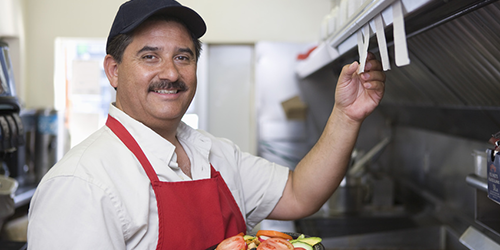
Food Safety Program
Our Food Safety Program is
- Committed to innovating through excellence
- Striving for continuous improvement
- Reaching out to the community
- Supporting a well-educated and professional staff
- Increasing transparency
- Making data-based decisions
- Ensuring the availability of safe food for the community through partnerships with the local food industry and community groups
Supporting Safe Food Vendors
Permitted vendors comply with laws and standards that keep your food safe.
Sonoma County Environmental Health (EH) is committed to protecting public health by making sure the food served to our community is safe, clean, and reliably prepared. We regulate the sale and distribution of food to the public by issuing permits to food facilities—whether they’re permanent restaurants, temporary booths at approved community events, or mobile vendors like food trucks and carts.
When you see a permit from Environmental Health, you can feel confident that your favorite food vendors have been educated, inspected and received training to meet important food safety standards. On the other hand, unpermitted food vendors have not been educated, inspected, or trained to ensure that food safety standards are being maintained.
Buying food from permitted food vendors supports our local economy and helps to keep our community safe and healthy.
How can I recognize if a vendor is permitted?
- Look for our Sonoma County decal on the vendor’s cart or vehicle

Eating food from unpermitted vendors may increase your chances of getting sick.
What is the risk of eating food from an unpermitted food vendor?
- Lack of access to handwashing and restroom facilities
- Unknown where the food was purchased, prepared or stored
- Unknown if food was transported safely and if it is being reused from a previous day.
- Food may be held outside of temperature control, leading to the rapid growth of harmful bacteria that may make you sick
- Equipment used may be unsafe
- Open flames can be dangerous
- Materials not intended as food contact surfaces
- Metal and plastic fragments
- Food stored in containers that are not food safe and can contaminate the food
- Cooking equipment and utensils may be dirty and unable to be cleaned on-site. Equipment that has not been cleaned and sanitized leads to the growth of harmful bacteria
- Cutting boards, knives, tongs, and wiping cloths may not be clean
- Food not protected from flies, dust and other contaminants
- Lack of verified food safety training
- May be operating in locations without the permission of the property owner or local municipality
- May leave garbage, food debris, grease and wastewater behind
- May discharge wastewater and grease into our storm drains
What are some ways to identify an unpermitted food vendor?
- Tent set-up on the roadside not part of an organized event or farmers’ market
- May be located on a street corner, sidewalk or parking lot.
- May be selling food from the back of a vehicle, shopping cart, or ice chest
- May be going door-to-door
- May be selling from their garage or backyard
- May be present outside a large venue or event, like a concert or show
- No permit sticker visible on their vehicle or cart
How to I obtain a permit to operate?
or call 707-565-4508
How do I report a potential unpermitted vendor?
or call 707-565-6565
Coronavirus COVID-19 Guidance
Food Safety Resources
Partially Hydrogenated Oils (PHOs) Declaratory Order Effective June 18, 2018
The Food and Drug Administration (FDA) issued a final determination regarding PHOs and has determined that they are not generally recognized as safe (GRAS) for human consumption. This means that PHOs, which are the primary dietary source of industrially-produced trans fats, can no longer be used or served in a retail food facility. The FDA regulation went into effect June 18, 2018 and has different compliance dates for manufacturers of PHOs. Please visit the following links for further information and compliance schedule details of this order:
What are Partially Hydrogenated Oils (PHOs)?
- Most commonly known as trans fat
- A type of fat formed when liquid oils are made into solid fats (shortening and hard margarine)
- PHOs are made when hydrogen is added to vegetable oil (hydrogenation process) to increase shelf-life and flavor stability of foods
Featured Services
Food Safety Manager Certification
Most food facilities are required to have at least one person, an owner or designated employee, who has passed an approved food safety certification exam. Most of the other facility employees are required to have a California Food Handler Card.
Cottage Food Operations (CFO's)
California Health & Safety Code (Cal Code) allows you to prepare certain non-perishable foods in your home and sell to the public with a cottage food operation (CFO) registration or permit.
 Translate
Translate